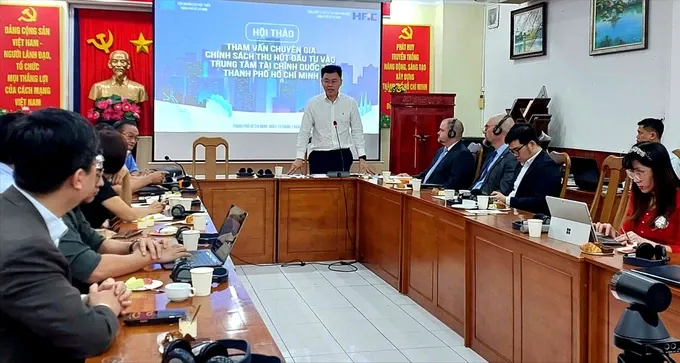
Yesterday afternoon, the Ho Chi Minh City Institute for Development Studies and Ho Chi Minh City State Financial Investment Company (HFIC) held a workshop to listen to experts’ opinions on policies to attract investment in the Ho Chi Minh City International Financial Center.
Experts asserted that the successful development of Ho Chi Minh City's International Financial Center necessitates a thorough assessment and strategic utilization of Vietnam's distinctive competitive advantages to differentiate itself from other prominent financial centers worldwide.
Chairing the conference, Director Truong Minh Huy Vu of the Ho Chi Minh City Institute for Development Studies said that the Government is drafting a Resolution on the financial center to submit to the National Assembly in May 2025. At the conference, many experts said that the Ho Chi Minh City International Financial Center needs to focus on Vietnam's unique strengths and differences.
Assoc. Prof. Nguyen Huu Huan from Ho Chi Minh City University of Economics (UEH) stated that while Dubai (United Arab Emirates) and Singapore offer attractive tax incentives, simply lowering tax rates in Vietnam will not set the country apart.
He emphasized that Vietnam's competitive advantage lies in the low costs associated with starting a business, which are significantly lower than those in established financial hubs. For instance, the expense to establish a business in Vietnam is merely VND5 million whereas in Singapore, it can range from US$5,000 to $10,000.
Additionally, office rental costs in Vietnam are more affordable compared to those in Dubai, Singapore, or Hong Kong (China).
According to Associate Professor Nguyen Huu Huan, while Singapore has created a favorable tax environment with zero percent but it imposes substantial fees on various transactions, including even basic services like opening a bank account. In contrast, Vietnam offers a more competitive tax landscape without collecting fees.
Moreover, Associate Professor Huan emphasizes that attracting fintech firms offers Vietnam a large opportunity to distinguish itself in the global affairs of finance in addition to the country’s above-mentioned unique advantage.
Chairman Nguyen Ngoc Hoa of the Board of Members of Ho Chi Minh City State Financial Investment Company (HFIC), raised a question regarding the competitiveness of the financial center. He was wondering that since Vietnam's financial center was established later, if its offerings are similar to those of other global centers, will it be sufficiently attractive and competitive?
He took the Dubai Financial Center as the example. According to him, although the Dubai Financial Center was established later, it has successfully concentrated on capital raising specifically for the aviation sector.
At the workshop, Country Director of the Tony Blair Institute (TBI) in Vietnam Rich McClellan affirmed that he will actively support Vietnam in building an international financial center. Moreover, foreign experts pointed out the policies that Vietnam needs to focus on, such as preferential policies and communications.
Meanwhile, expert Tran Du Lich proposed developing a derivatives market. Vietnam has many of the world's leading agricultural products but does not yet have a derivatives market.
























